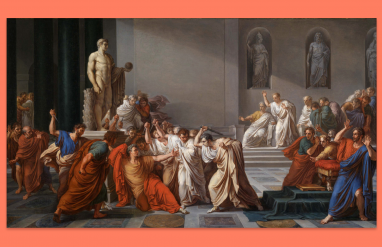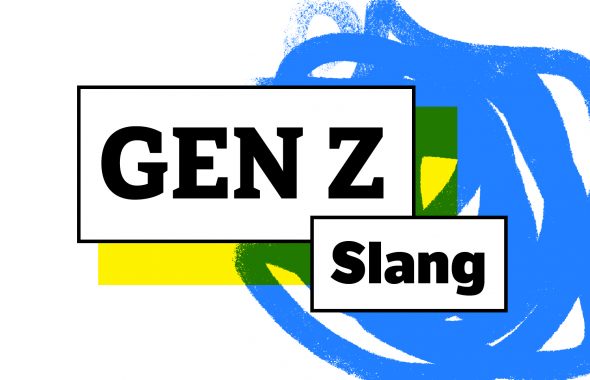by Claire Evans
K-pop is the name of a pop music sensation that originated in South Korea and is sweeping the globe. From its energetic choreography and music to the beauty of its idols, K-pop (or K for Korea combined with pop) has entranced international and Korean fans alike—and chances are you’ve heard it, hummed it, or danced to it. (Did you catch BTS’ “Friends” playing in the Marvel movie Eternals? And who knew Clifford the Dog was also a K-pop stan? At least, his trailer made it seem so.)
Emerging from the 1990s, K-pop has created a unique fandom culture along the way. Fans have indulged fully in this media, creating their own celebrations, traditions, and—of course—slang. All of this can overwhelm the casual listener trying out K-pop sounds, and I have to admit, I once thought this fandom was a little over the top. But I’ve since been won over—after all, being a fan of a group like Red Velvet is no different from being a fan of Ariana Grande.
To get you started, I am providing a short guide to K-pop’s complex terminology. Whether you’re interested in K-pop, saw BTS on the news, or have friends who listen to all of the above, here are a few terms to know.
Please note: these words are used mainly by English-speaking international fans and are found across fan Twitters, Instagrams, TikToks and Tumblrs.
🎶 Pop over to the quiz when you're ready!
If you’re already a member of BTS’ ARMY or have an enviable collection of photocards, you can take this quiz to see how much bang your K-pop vocab has. Or review the list below before setting your sights on the quiz. No room for antis here!
bias
In K-pop slang, a bias is a member in a group that you like or relate to the most. K-pop fans collect merchandise—for example, photocards (more on that later)—of their biases. Fans use this term to learn more about other fans.
Example: Who is your Twice bias? (And you’d answer with your favorite.)
biaswrecker
Although fans have their fundamental biases, it doesn’t mean that a bias is monogamous. Most fans with biases will have their biaswreckers, too. These wreckers are members in a group that make you question who your true bias is.
sasaeng
One group of people widely looked down upon are sasaengs (사생팬) or sasaeng fans. This slang derives from a Korean word (sa for “private” and saeng for “life”) that refers to an obsessive fan who stalks or otherwise violates the privacy of a Korean idol. Sasaengs tend to own fan pages, and some say they operate much like the American tabloids of the 2000s.
comeback
When an idol group releases new music, it’s called a comeback. Comebacks usually take place every few months and include new promotions, hair colors, styles, music, etc. Era is another word used in this fandom to describe a comeback.
Example: Did you hear that BTS are having a comeback in June?
nugu
This word literally means “Who?” in Korean, and is used by fans to describe small and relatively unknown idol groups. A group like IVE would not be described as a nugu (누구) but the girl group Weki Meki would.
visual
In K-pop, there are roles for each idol in a group, including a role as visual. The visual role is assigned by the company to the member or members in a group who best fit a strict Korean beauty standard. Fans also debate who they believe the visual to be in each group. For example, Jin is the official visual of the group BTS, but many consider Taehyung to fit the role. This harsh beauty standard prizes small facial features, cuteness, and specific measurements of the face, body, eyes, and much more.
aegyo
Aegyo (애교) can be used to describe K-pop idols (both male and female) who are acting cute and childlike. Aegyo moves require specific word choices, vocal tones, and both facial and body gestures. Aegyo (often translated as “cuteness”) is usually meant to show a flirtatious side of idols and is also used by the general Korean population.
Example: The judges made Felix do aegyo as a punishment for losing the game.
maknae
Another Korean word that has been adopted into international fan spaces is maknae (막내) or “youngest person.” This slang is used to describe the youngest member of a group. The term maknae, much like visual, is a role a member takes on.
trainee
When an idol is training before they debut, they are considered a trainee. These trainees usually take part in promotions, trying to gain popularity before their debut. Trainees typically are under contract and fulfill years of rigorous training to be able to match the abilities of many idols you see today.
subunit
In some idol groups subunits are formed. These units comprise a few members in a group who create their own music or albums. Some groups, such as LOONA and NCT, use subunits as their concept. This term can also describe two or three members in a group who have a similar skill or talent (like a vocal or dance unit).
antis
Anti or anti-fan is used to describe people who hate an artist or group so much that they seem to follow their activities and content as much or more than a fan would. Some of these antis display sasaeng behavior, dedicating themselves completely to taking down or hate speech idols. These hate campaigns contain criticizing and insulting language. Shockingly, some antis have gone so far as hurting idols in real life.
delulu
This term is short for delusional, and it’s used to mock fans who believe they’ll date, marry, or befriend their favorite idol. The word can describe a fan who devotes an unhealthy amount of time and energy to an idol. You could say becoming a delulu is a first step on the pipeline towards sasaeng and usually includes behavior similar to said sasaeng.
Example: Did you see that guy talking about how he and Nayeon are dating? He’s such a delulu.
solo stan
When a fan of an idol group only stans a single member, they are a self-proclaimed solo stan or are labeled as such by others in the community. A solo stan might hate other members in a group, which is why the term has a negative connotation in the community. The word solo stan also can describe someone who’s a fan of a singular idol (like Sunmi or IU) who does not participate in idol groups.
The word stan goes back a bit further. Check out these facts about it and other older slang.
photocard
Photocards (or pocas or PCs) are typically 3” by 2” pieces of glossy paper photos included in a K-pop albums and prized by fans. They may not sound like much to the average joe, but to the average Jimin fan, these pictures are worth hundreds to thousands of dollars.
the Big 3
In Korea, idols are contracted under companies. The Big 3 describes the main three corporations that famous idols usually sign under. These three companies are HYBE Entertainment (previously known as BigHit Entertainment), with groups like BTS and TXT; SM Entertainment, with groups like Girls Generation and Aespa; and YG Entertainment, producing groups like BLACKPINK and iKON. The Big 3 not only produce idols but also sign and manage actors. JYP Entertainment can also be considered as part of the Big 3 (HYBE is a relative newcomer to the list), leading some to use the term “Big 4.”
netizen
The term netizen does generally mean an internet user, but it’s used in K-pop to refer to Korean fans who are online intensively. These fans or anti-fans are internet sleuths and usually the ones to create scandals and/or help in proving rumors wrong or right about specific idols. Netizens (or also K-netizens) hold power in the idol industry; companies want these internet personas to view their idols in a positive light and do their best to prevent scandals that might mobilize netizens.












